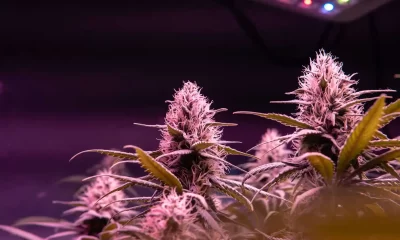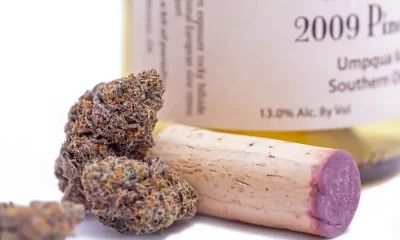Business
Cannabis Industry Takes On Deadbeat Dealers

Regardless of the reasons why, it looks as if patience has run thin, and the industry is doing what it can to protect itself from deadbeat dealers.
The cannabis industry is taking it upon itself to address deadbeat dealers within the industry — the people taking cannabis products to sell and then not paying for them.
From the smallest to some of the largest companies, many are having a hard time getting paid for delivered products. The most common payment term in retail is 30 days after the receipt of the product, however, that is being stretched to 60 and even 90 days in the cannabis industry.
Sometimes it’s never, which is prompting the industry to take matters into its own hands.

Self-policing
“Some states and the brands within those states themselves, are actually forming their own coalitions together to start announcing and publicizing some of the companies that they should and should not do business with,” said Brett Gelfand, managing partner of Cannabiz Collects. “Cannabiz Collects is actually working on leveraging our own data as well to build an association to help our clients and members prevent further issues in the future, based on the data of the 3,500 claims that we’ve gotten submitted through our agency, so things are starting to pop up.”
Cannabiz Collects negotiates with businesses to get unpaid bills resolved. In turn, the company receives a portion of the recovered payment. Gelfand said one of the challenges towards recognizing the deadbeats is that most companies don’t report the accounts receivable data on a regular monthly basis, which makes it harder to recognize repeat offenders.
“Unfortunately, we’ve had the same experience as everyone else — waiting to get paid,” Jason Vegotsky, CEO of Petalfast said. “There’s actually a group now in California of the leading distributors that have come together. We share notes on a weekly basis with each other on who’s paying and who is not paying.”
That led to a behind-the-scenes “credit rating” used by distributors to identify the bad actors and an informal arrangement to not do business with the ones that weren’t paying.
He went on to say that eventually, as the bad actors realize they can’t get product to sell, it motivates them to pay up. He even noted that in California there was a behind-the-scenes credit rating with the distributors.
“It’s been nice for everybody to work together to solve this problem,” Vegotsky said.
Wholesale platform LeafLink is on the front lines of the issue as brands and producers display their wares for others to buy. The company said, “If a buyer is unable to complete payment on a transaction made through the LeafLink marketplace, their accounts are paused until the issue is resolved. Should the buyer or seller not fulfill their agreement, they are not able to use LeafLink offerings.”
LeafLink said it works to protect both the buyers and sellers and that both have to meet compliance and underwriting requirements.

No Credit in New York
The newest entrant into legalized adult-use cannabis, New York specifically stated that cannabis can’t be bought on credit: “No registered organization, licensee, or permittee, or other entity under the jurisdiction of the board, shall sell, deliver or give away, or cause, permit or procure to be sold, delivered or given away any cannabis, cannabis product, or medical cannabis on credit; except that a registered organization, licensee, or permittee may accept third-party credit cards for the sale of any cannabis.”
Since most credit cards can’t be used to purchase cannabis, it seems that New York will be a mostly cash-up-front market.
Some blame the cash crunch on businesses simply not being able to pay for inventory, while others think that cannabis operators just believe contract law is only a suggestion. Still others shrug and say “That’s cannabis for ya.”
Regardless of the reasons why, it looks as if patience has run thin, and the industry is doing what it can to protect itself from deadbeat dealers.
Source: https://thefreshtoast.com/cannabusiness/cannabis-industry-takes-on-deadbeat-dealers/
Business
New Mexico cannabis operator fined, loses license for alleged BioTrack fraud

New Mexico regulators fined a cannabis operator nearly $300,000 and revoked its license after the company allegedly created fake reports in the state’s traceability software.
The New Mexico Cannabis Control Division (CCD) accused marijuana manufacturer and retailer Golden Roots of 11 violations, according to Albuquerque Business First.
Golden Roots operates the The Cannabis Revolution Dispensary.
The majority of the violations are related to the Albuquerque company’s improper use of BioTrack, which has been New Mexico’s track-and-trace vendor since 2015.
The CCD alleges Golden Roots reported marijuana production only two months after it had received its vertically integrated license, according to Albuquerque Business First.
Because cannabis takes longer than two months to be cultivated, the CCD was suspicious of the report.
After inspecting the company’s premises, the CCD alleged Golden Roots reported cultivation, transportation and sales in BioTrack but wasn’t able to provide officers who inspected the site evidence that the operator was cultivating cannabis.
In April, the CCD revoked Golden Roots’ license and issued a $10,000 fine, according to the news outlet.
The company requested a hearing, which the regulator scheduled for Sept. 1.
At the hearing, the CCD testified that the company’s dried-cannabis weights in BioTrack were suspicious because they didn’t seem to accurately reflect how much weight marijuana loses as it dries.
Company employees also poorly accounted for why they were making adjustments in the system of up to 24 pounds of cannabis, making comments such as “bad” or “mistake” in the software, Albuquerque Business First reported.
Golden Roots was fined $298,972.05 – the amount regulators allege the company made selling products that weren’t properly accounted for in BioTrack.
The CCD has been cracking down on cannabis operators accused of selling products procured from out-of-state or not grown legally:
- Regulators alleged in August that Albuquerque dispensary Sawmill Sweet Leaf sold out-of-state products and didn’t have a license for extraction.
- Paradise Exotics Distro lost its license in July after regulators alleged the company sold products made in California.
Golden Roots was the first alleged rulebreaker in New Mexico to be asked to pay a large fine.
Source: https://mjbizdaily.com/new-mexico-cannabis-operator-fined-loses-license-for-alleged-biotrack-fraud/
Business
Marijuana companies suing US attorney general in federal prohibition challenge

Four marijuana companies, including a multistate operator, have filed a lawsuit against U.S. Attorney General Merrick Garland in which they allege the federal MJ prohibition under the Controlled Substances Act is no longer constitutional.
According to the complaint, filed Thursday in U.S. District Court in Massachusetts, retailer Canna Provisions, Treevit delivery service CEO Gyasi Sellers, cultivator Wiseacre Farm and MSO Verano Holdings Corp. are all harmed by “the federal government’s unconstitutional ban on cultivating, manufacturing, distributing, or possessing intrastate marijuana.”
Verano is headquartered in Chicago but has operations in Massachusetts; the other three operators are based in Massachusetts.
The lawsuit seeks a ruling that the “Controlled Substances Act is unconstitutional as applied to the intrastate cultivation, manufacture, possession, and distribution of marijuana pursuant to state law.”
The companies want the case to go before the U.S. Supreme Court.
They hired prominent law firm Boies Schiller Flexner to represent them.
The New York-based firm’s principal is David Boies, whose former clients include Microsoft, former presidential candidate Al Gore and Elizabeth Holmes’ disgraced startup Theranos.
Similar challenges to the federal Controlled Substances Act (CSA) have failed.
One such challenge led to a landmark Supreme Court decision in 2005.
In Gonzalez vs. Raich, the highest court in the United States ruled in a 6-3 decision that the commerce clause of the U.S. Constitution gave Congress the power to outlaw marijuana federally, even though state laws allow the cultivation and sale of cannabis.
In the 18 years since that ruling, 23 states and the District of Columbia have legalized adult-use marijuana and the federal government has allowed a multibillion-dollar cannabis industry to thrive.
Since both Congress and the U.S. Department of Justice, currently headed by Garland, have declined to intervene in state-licensed marijuana markets, the key facts that led to the Supreme Court’s 2005 ruling “no longer apply,” Boies said in a statement Thursday.
“The Supreme Court has since made clear that the federal government lacks the authority to regulate purely intrastate commerce,” Boies said.
“Moreover, the facts on which those precedents are based are no longer true.”
Verano President Darren Weiss said in a statement the company is “prepared to bring this case all the way to the Supreme Court in order to align federal law with how Congress has acted for years.”
While the Biden administration’s push to reschedule marijuana would help solve marijuana operators’ federal tax woes, neither rescheduling nor modest Congressional reforms such as the SAFER Banking Act “solve the fundamental issue,” Weiss added.
“The application of the CSA to lawful state-run cannabis business is an unconstitutional overreach on state sovereignty that has led to decades of harm, failed businesses, lost jobs, and unsafe working conditions.”
Business
Alabama to make another attempt Dec. 1 to award medical cannabis licenses

Alabama regulators are targeting Dec. 1 to award the first batch of medical cannabis business licenses after the agency’s first two attempts were scrapped because of scoring errors and litigation.
The first licenses will be awarded to individual cultivators, delivery providers, processors, dispensaries and state testing labs, according to the Alabama Medical Cannabis Commission (AMCC).
Then, on Dec. 12, the AMCC will award licenses for vertically integrated operations, a designation set primarily for multistate operators.
Licenses are expected to be handed out 28 days after they have been awarded, so MMJ production could begin in early January, according to the Alabama Daily News.
That means MMJ products could be available for patients around early March, an AMCC spokesperson told the media outlet.
Regulators initially awarded 21 business licenses in June, only to void them after applicants alleged inconsistencies with how the applications were scored.
Then, in August, the state awarded 24 different licenses – 19 went to June recipients – only to reverse themselves again and scratch those licenses after spurned applicants filed lawsuits.
A state judge dismissed a lawsuit filed by Chicago-based MSO Verano Holdings Corp., but another lawsuit is pending.
Source: https://mjbizdaily.com/alabama-plans-to-award-medical-cannabis-licenses-dec-1/
-

 Business2 years ago
Business2 years agoPot Odor Does Not Justify Probable Cause for Vehicle Searches, Minnesota Court Affirms
-

 Business2 years ago
Business2 years agoNew Mexico cannabis operator fined, loses license for alleged BioTrack fraud
-

 Business2 years ago
Business2 years agoAlabama to make another attempt Dec. 1 to award medical cannabis licenses
-

 Business2 years ago
Business2 years agoWashington State Pays Out $9.4 Million in Refunds Relating to Drug Convictions
-

 Business2 years ago
Business2 years agoMarijuana companies suing US attorney general in federal prohibition challenge
-

 Business2 years ago
Business2 years agoLegal Marijuana Handed A Nothing Burger From NY State
-

 Business2 years ago
Business2 years agoCan Cannabis Help Seasonal Depression
-

 Blogs2 years ago
Blogs2 years agoCannabis Art Is Flourishing On Etsy













